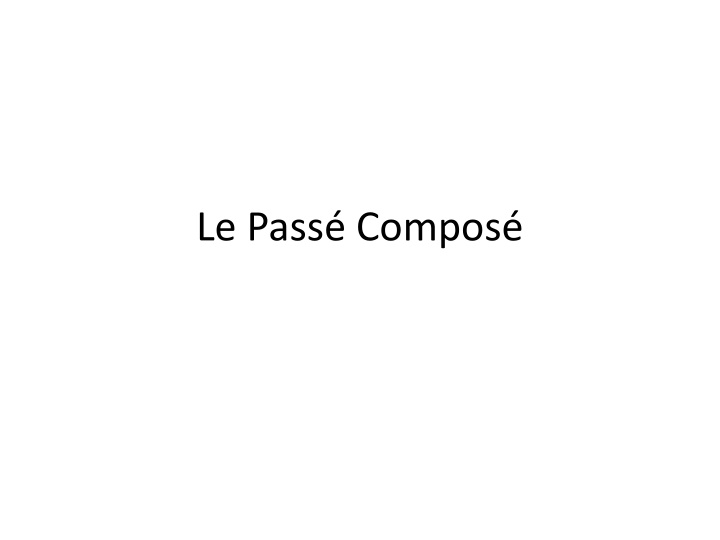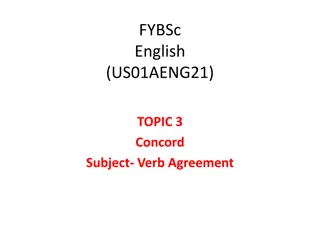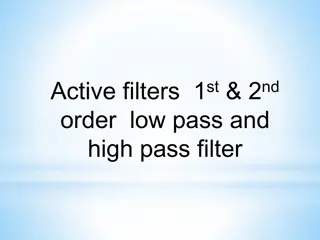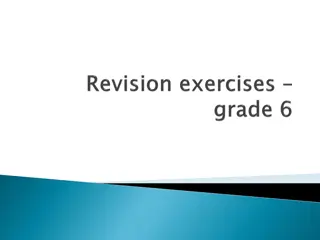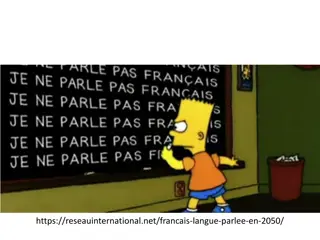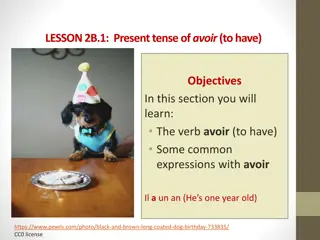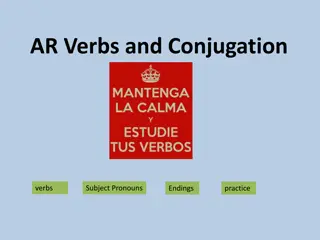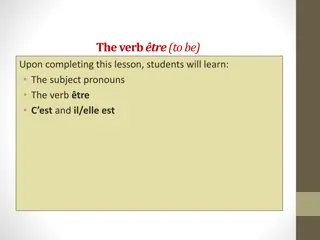Mastering Le Passé Composé: French Verb Conjugation Guide
Understand how to form and use Le Passé Composé in French with this comprehensive guide. Learn about subject-verb agreement, irregular past participles, verbs using "être," and more. Enhance your French language skills and confidently express past actions.
Download Presentation

Please find below an Image/Link to download the presentation.
The content on the website is provided AS IS for your information and personal use only. It may not be sold, licensed, or shared on other websites without obtaining consent from the author.If you encounter any issues during the download, it is possible that the publisher has removed the file from their server.
You are allowed to download the files provided on this website for personal or commercial use, subject to the condition that they are used lawfully. All files are the property of their respective owners.
The content on the website is provided AS IS for your information and personal use only. It may not be sold, licensed, or shared on other websites without obtaining consent from the author.
E N D
Presentation Transcript
Format Subj + Helping Verb + Past Participle Helping Verb: avoir or tre avoir J ai Nous avons Tu as Vous avez Il/Elle a Ils/Elles ont Il/elle est Ils/Elles sont tre (only with certain verbs!) Je suis Nous sommes Tu es Vous tes
To get the Past Participle: Take off the ending of the action verb you are using and replace with the following: - er - - ir - i - re - u Ex: parler parl Ex: finir fini Ex: perdre perdu
Common Irregular Past Participles avoir tre faire mettre prendre voir eu t fait mis pris vu
Now put it together! Ex: J ai parl . I spoke. Ex: Tu as perdu le match. You lost the game. Ex: Elles ont mang . They ate.
And the verbs that use tre? There are 17 verbs (for now, anyway) that use tre as their helping verb. They are called Dr Mrs Vandertrampp verbs (it s an acronym) There are 5 irregular past participles in the list.They are underlined.
D evenir to become / devenu R evenir to come again/ revenu M onter to go up/to get on R ester to stay S ortir to go out V enir to come/ venu A ller to go N a tre to be born/ n
D escendre to go down/to get down E ntrer to enter R entrer to return (home) T omber to fall R etourner to go back A rriver to arrive M ourir to die/ mort P asser to pass (by) P artir to leave
Not quite done If you use tre as your helping verb because you are using a Dr Mrs Vandertrampp verb, you must have Subject/Verb agreement. Add these to the end of the past participle. masculine feminine masculine plural feminine plural ---- -e -s -es
Now put it together! Ex: Je suis all au magasin. I went to the store. (And I am a dude.) Ex: Elles sont sorties. They went out. (the girls) *Vous and Nous forms will always be mpl.
Now: avoir or tre? Step 1: Look at your verb. Is it DRMRSV? no use avoir yes use tre Step 2: Look at your subject: Conjugate Helping Verb Step 3: Look at your verb again. Is it irregular? no find PP yes put irregular PP Step 4: Look at your verb again. Is it DRMRSV? no you re done! Yes add agreement
Negation Format: Subj + ne(n ) + Helping Verb + pas + Past Participle ne and pas will hug the helping verb. use n if your helping verb begins with a vowel. Ex: Je n ai pas mang . I didn t eat.
Negation with jamais d j ever, already ne jamais never Ex: Est-ce que tu as d j mang des escargots? - Have you ever eaten snails? Ex: Non, Je n ai jamais mang des escargots. - No, I have never eaten snails.
More negation quelque chose something Ne rien nothing Ex: Tu as entendu quelque chose? Did you hear something? Ex: Non, je n ai rien entendu. No, I heard nothing.
quelquun someone/somebody ne personne no one/nobody DOES NOT FOLLOW THE SAME RULE! Ex: Je n ai vu personne. I saw no one. (I didn t see anyone.) Personne will come after the past participle.
